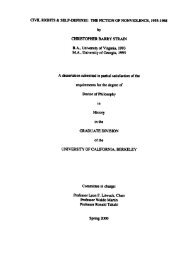Negro Digest - Freedom Archives
Negro Digest - Freedom Archives
Negro Digest - Freedom Archives
Create successful ePaper yourself
Turn your PDF publications into a flip-book with our unique Google optimized e-Paper software.
l~oohs I~ofed (Continued from page 52)<br />
78<br />
perhaps adaptiveness of present forms . Black consciousness, in any<br />
case, can be a conscious or an unconscious effort in blackwriting (if<br />
one is black it's very difficult to write otherwise) . Although, we<br />
must understand, there will be a pervasive presence of every and anything<br />
that is indigenous to the Afro-American people . Blackart is a<br />
functional art ; it's what the Africans call a collective art . Our art is<br />
committed to humanism . It commits the artist. "They commit him in<br />
a future which then becomes present for him, an integral part of himself<br />
." The blackwriter/artisan works out a concrete situation which<br />
means that "he commits not only himself but his race, his geography .<br />
his history as well. He uses the materials that are at hand and the<br />
everyday things which make up the texture of his life, rejecting the<br />
anecdotal, for this does not commit because it is without significance."<br />
Blackart, as is African art, is perishable. This, too, is why it is functional<br />
. Like, a poem is written not to be read and put aside but to<br />
actually become a part of the giver and receiver ; to perform some<br />
function, to move the emotions, to become a part of the dance or to<br />
simply make one act . Whereas, the work itself is perishable the style<br />
and spirit of the creation is maintained and is used to produce new<br />
works . Here we can clearly see that art for art's sake is something<br />
out of a Shakespearian dream ; it does not exist . All blackart is social<br />
(art for people's sake) .<br />
An example of good blackwriting now in existence is an anthology<br />
called Black Fire, edited by LeRoi Jones (Ameer Baraha) and Larry<br />
Neal (Morrow, 670 pp ., $8 .95) . Black Fire includes between its<br />
jackets a convincing collection of Afro-American literature . Its 70 contributors,<br />
plus its editors, move to define and to present a forceful<br />
concentration of blackwriting with essays, poems, short stories, and<br />
plays . This is not to say that every author represented in Black Fire<br />
has contributed a work of art in accordance with my standards. But<br />
it is to say that every selection of work in Black Fire is significant .<br />
Significant, in that I feel that the test of a good writer/poet is not necessarily<br />
in what he says, or how he says it, but in what his work does<br />
to us . I mean, does the writer widen us, does he clear our vision, does<br />
he add to a deepening of our knowledge, does he amplify our total<br />
being?<br />
The Saturday Review said of Black Fire : "the ambitions of Black<br />
Fire make it newsworthy and instructive, but the disparity between its<br />
ambitions and its achievement is painful and embarrassing ." Painful<br />
and embarrassing to whom? Certainly not to those who contributed<br />
to it, certainly not to the blackpeople who read it (not many at $8 .95),<br />
certainly not to me . But yes, "painful and embarrassing" to some<br />
white boy who teaches English at Williams College in Massachusetts<br />
and has, in all likelihood, only seen six "negroes" in his life-time ; who<br />
feels that just because Saturday Review sends him the books to review<br />
it's his responsibility to be "painful" and "embarrassed" about it (quietas-it's-kept,<br />
it was supposed to be painful for him) . And vet . this<br />
"painful and embarrassing" reviewer from Williams College goes on<br />
Mareh 1969 NEGRO DIGEST
















